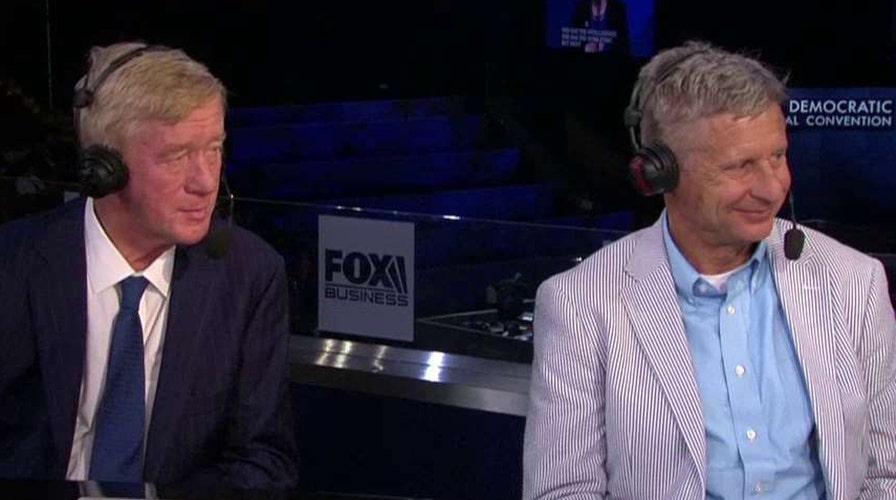Johnson-Weld on the strength of the Libertarian ticket
The Libertarian nominees explain what they would do differently from the Republicans and Democrats
The Libertarian Party ticket, facing what polls show are two of the most unpopular presidential candidates in modern American history, is seeing a bump in support as the general election race moves into full swing – and a surge in interest that could carry nominee Gary Johnson onto the prized debate stage this fall.
Despite Donald Trump and Hillary Clinton’s popularity issues and trust gap with voters, few expect the Libertarian ticket to pose a Ross Perot-style threat this year.
But the party is far more than a political curiosity in 2016. Rumors are swirling in the wake of the major-party conventions that high-profile Republicans are now considering backing the ticket; a recent video from Johnson and running mate William Weld generated considerable buzz; and the polls show Johnson getting close to 15 percent – the threshold he needs to reach to land him on the debate stage with Trump and Clinton this fall.
The RealClearPolitics average has Johnson at 8.4 percent in a four-way race with Trump, Clinton and Green Party candidate Jill Stein, up from 4.5 percent in June. The latest Fox News poll released Wednesday, after the conventions, put Johnson at 12 percent.
An NBC poll taken toward the end of the Democratic convention put Johnson at 9 percent, roughly where he was in prior polling.
Party officials said the unpopularity of the Republican and Democratic candidates gives the party an “unprecedented opportunity.”
“It goes from week to week and day to day watching for what new thing [Clinton and Trump are] going to do to become more unpopular with the American people, and frighten people,” Nicholas Sarwark, chairman of the Libertarian National Committee, told FoxNews.com. “Those candidates are the gift that keeps on giving. We’re running as the qualified adult in the room.”
Sarwark pointed to Johnson’s record as a two-term New Mexico governor, “re-elected as a Republican in a Democratic state,” in touting his credentials and appeal.
Unclear is whether the support in the polls will translate into support at the ballot box. In 2012, Johnson won just 0.99 percent of all votes cast -- making him the most successful White House candidate in Libertarian history, but not making much of a dent in the race as a whole.
But this year, there are plenty of signs more voters are seeking an alternative candidate. At the Democratic convention last week, many Bernie Sanders supporters were getting on board with the Green Party’s Stein. But so far, Johnson is polling the best among third-party candidates.
He and his running mate, former Massachusetts Gov. Weld, generated some buzz before the conventions with a slick video ad listing their accomplishments.
Are #youin? Check out our new video -- and spread it around. #election2016 #TeamGov pic.twitter.com/9X6iNNzZW2
— Gov. Gary Johnson (@GovGaryJohnson) June 30, 2016
“We’ve been there ... And done that!” the candidates say.
Johnson said in an interview Monday with the Los Angeles Times that he believes in addition to appealing to disenfranchised Republicans on issues like free trade, low taxes and smaller government, the Libertarian stance on social issues and foreign policy could bring Sanders voters on board.
Sarwark said the party is banking that while Trump and Clinton are about as well-known as they are going to be, Johnson still can introduce himself to voters not familiar with his story – especially if he is able to get on the debate stage.
This is far from a foregone conclusion.
So far, while Johnson’s support is higher than in past years, an 8.4 percent average is still a distance from the 15 percent he’d need to make the debates.
He has until the middle of September to hit 15 percent in not just one poll but an average of five recent polls chosen by the Commission on Presidential Debates.
“Politically, where we stand, is we have to get into those presidential debates to really stand a chance,” Weld told The Wall Street Journal last week. “If we catch a break or two, we may get there.”
Even then, the record for third-party or independent candidates is not strong.
In recent political history, the one who came closest to the presidency was businessman Perot in 1992 – who was an independent, not technically a third-party candidate. At one point, Perot was leading in some polls against then-President George H. W. Bush and Democratic challenger Bill Clinton. However, after dropping out of the race before re-entering, he lost support. He eventually garnered 19 percent of the vote, with some Republicans arguing he split the GOP vote and handed the election to Clinton.
Republicans, meanwhile, were arguably given a boost by Green Party candidate Ralph Nader in 2000, when Nader picked up 2.7 percent of the vote against Democrat Al Gore and Republican George W. Bush.
Johnson’s potential impact is hard to gauge. The latest Fox News poll found Johnson siphoning support about equally from the Democratic and GOP candidates.
But he could get a boost in the coming weeks as some Republicans reportedly consider backing him.
Most notably, 2012 Republican nominee Mitt Romney and former Florida Gov. Jeb Bush reportedly are mulling endorsements for Johnson. Marvin Bush, youngest brother of Jeb and George W., also endorsed Johnson last week.
“From what I’ve heard from the Bush and Romney camps, they’re still considering it,” Sarwark claimed.
Asked if the party is looking just to make a strong showing, or go all the way, Sarward was bullish: “There’s a path to the presidency. The ground is there.”













































